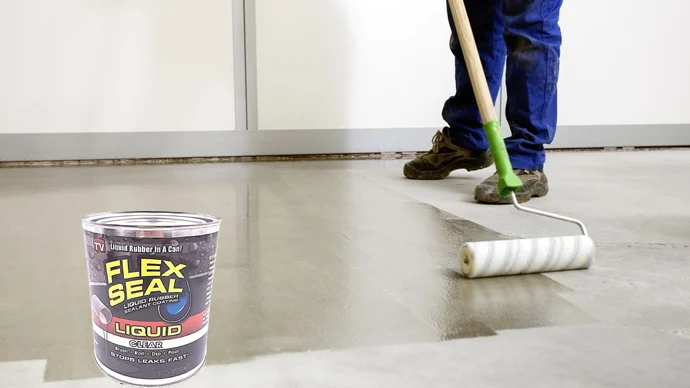When your basement is not waterproof, water can pool on the floor after heavy rain, causing long-term problems such as fungus growth, wood rot, and even structural damage. Flex Seal is one option that promises to do the job. But can you use a Flex Seal to waterproof a basement?
A small leak can quickly become a significant issue, and if not correctly waterproofed, your basement can become a breeding ground for germs and bacteria. Basement waterproofing with Flex Seal helps to prevent water from seeping into the basement. This rubberized coating product works on both painted and bare surfaces.
Waterproofing your basement will help to prevent flooding, and it will also keep your valuables safe from flooding destruction. Keep reading to learn more about how Flex Seal can seal your basement.
How Can You Use Flex Seal to Waterproof a Basement?
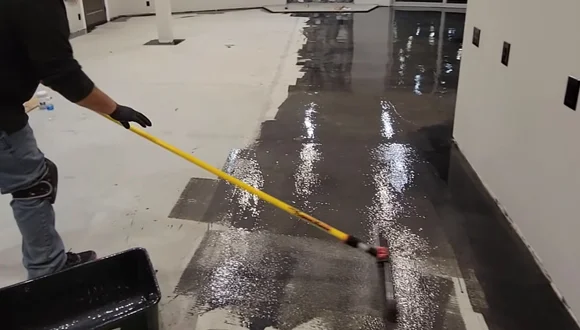
For waterproofing basements, Flex Seal is one of the most widely recognized products. Using Flex Seal, you can ensure that no water will enter the basement. Upon application, the product coats, seals, and protects foundation cracks through which water can enter.
If you have a basement prone to flooding, here are the steps you need to take:
Step 01. Gather All Materials
When working with Flex Seal to insulate a basement, you will need:
- Wire brush
- Vacuum cleaner
- Dehumidifier/Fan
- Painter’s tape
- Drop Cloth/Plastic Sheeting
- Flex Shot
- Flex Seal Liquid MAX
- Paint Brush
- Plastic Paint Container
- Paint Roller
- Paint Tray
Step 02. Prepare the Applying Basement Area
Before applying Flex Seal to your basement, you must prepare the area properly. First, clear out any debris or obstacles that might get in the way of a smooth application. Next, use a wire brush to remove any loose paint or flakes.
Now power wash to clean the surface of the basement, paying special attention to any cracks or gaps. You can also use a vacuum cleaner with a hose attachment to remove any cobwebs or dust.
Next, cover the basement floor with drop cloth or plastic sheeting and secure them with painter’s tape. Once the area is clean and dry, you are ready to apply Flex Shot.
Step 03. Apply the Flex Shot
Basement cracks are notorious for being damp and musty, but there are ways to waterproof them to make them more resistant to flooding. One way to do this is by using Flex Shot with a caulking gun that applies a thick bead of sealant to cracks and holes.
Flex Seal spray shot forms a waterproof barrier that stops water from seeping in and causing damage. It is also great for sealing around windows and doors. To apply Flex Shot, point the nozzle at the area you want to seal and squeeze the trigger.
The sealant will come out in a thick bead that will adhere to the surface and create a tight seal into the cracks. Once the sealant has dried, it will be clear and will not affect the appearance of your basement.
Step 04. Apply the Flex Seal liquid
Unlike traditional sealants, Flex Seal can be applied directly to wet surfaces and will not wash away with rain or snow. It is also resistant to mold, making it ideal for use in damp basements. To apply Flex Seal, transfer some liquid into a plastic paint container or tray.
Using a paint brush or roller, apply the Flex Seal to the areas you want to waterproof. For best results, apply a thick coat of sealant. For the corners, it is best to use a paintbrush to reach the cracks better. You can also use Flex Seal Liquid MAX for larger jobs.
Because Flex Seal liquid self-levels, it may appear rough when applied to a surface, yet, the surface will start to smooth out as it dries. Ensure that you apply the product gently, pushing it into all cracks and divots rather than rolling it to ensure a level and sealed surface.
Step 05. Let the Seal Dry
Once you have applied the Flex Seal to all the cracks and gaps in your basement, let it dry for at least 24 hours. During this time, open all the windows and doors to ensure proper ventilation. If there is moisture in the air, use a dehumidifier or fan to help speed up the drying process.
After 24 hours, Flex Seal will be dry to the touch and will have formed a waterproof barrier. You can now use your basement wall without worrying about flooding or leaks.
Flex Seal is an excellent product for waterproofing basements and protecting them from flooding. Following the steps above, you can ensure that your basement is adequately sealed and protected from the elements.
Can You Waterproof with Flex Seal?
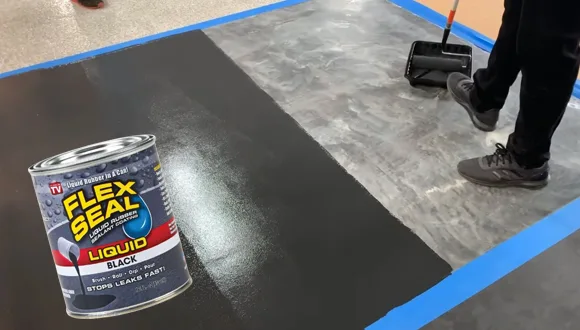
Flex Seal may be a good option if you want a product that can help you waterproof almost anything. A liquid rubber coating can be applied on various surfaces to protect them from water damage.
While this seal can be used on various materials, it is most commonly used on wood and concrete. The coating forms a waterproof barrier that helps to prevent rust, rot, and mold. Also, Flex Seal can repair leaks in roofs, gutters, and pipes.
Does Flex Seal Stop Water Leaks on Concrete Basement Foundations?
While Flex Seal can apply to many surfaces to prevent moisture penetration, it can prevent moisture from penetrating concrete basement foundations. This seal forms a watertight seal that prevents water from seeping through concrete cracks and gaps.
It can also be used to repair existing foundation wall leaks. While Flex Seal is not a permanent solution, it can provide temporary protection while you wait for a more permanent repair.
Is Flex Seal Liquid Recommended to waterproof Basement Walls?
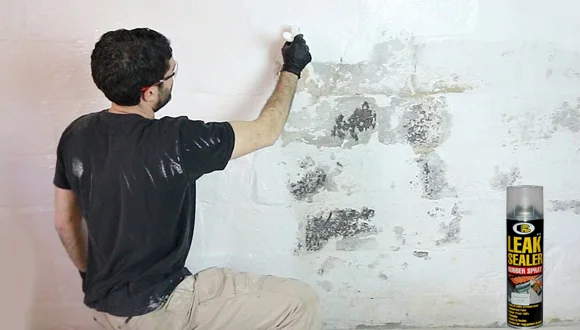
Flex Seal Liquid is an excellent option if you’re looking for a waterproofing solution for your basement walls. This product is easy to apply and dries to a durable, flexible finish to help keep your basement dry and free of leaks.
This liquid seal also resists mold, making it an ideal choice for wet basements. Also, this product can be used on various surfaces, including concrete, wood, metal, and more. So whether you’re dealing with minor leaks or want to protect your basement from future flooding, Flex Seal liquid is definitely worth considering.
Where Should You Not Use Flex Seal in a Basement?
Flex Seal can be used to seal cracks and holes in a variety of surfaces, but there are some situations where Flex Seal is not the best choice for basement interior waterproofing, such as:
- Flex Seal should not be used on actively leaking surfaces, as it will not completely stop the flow of water.
- It should not be used on surfaces that come into contact with food or drinking water, as it may leach chemicals into these items.
When used correctly, this seal can effectively waterproof a basement. Yet, you should understand its limitations to avoid potential problems.
Will Flex Seal Stick to Wet Concrete Basement Walls?
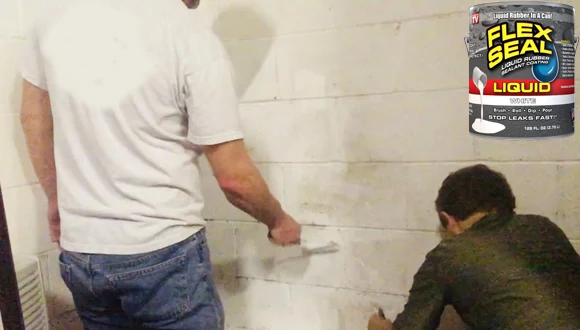
It’s common for concrete basement walls to get wet, especially if they’re not correctly sealed. But what about basement walls, and they’re already wet? Will Flex Seal still work? The short answer is yes.
This seal can still be used on wet concrete basement walls. But there are a few things to keep in mind:
- Flex Seal will take longer to dry if the surface is wet.
- Ensure that the surface is clean before applying Flex Seal. Any dirt or debris on the surface will be sealed in, making it crucial to ensure the surface is as clean as possible.
- You should apply Flex Seal in thin coats. If you use it too thick, it will take longer to dry and may not adhere well.
So if you need to seal your wet concrete basement walls, Flex Seal can still be used. Just keep these tips in mind, and you’ll be able to get the job done quickly and easily.
Does Flex Seal Dry Hard to Waterproof a Basement?
Flex Seal is an innovative product that promises to waterproof and seal almost anything. It comes in a can and can be sprayed on nearly every surface. But when it dries, Does it truly dry hard and waterproof a basement effectively?
The answer appears to be yes. Flex Seal does waterproof a basement and dries it hard quite well. There are numerous testimonials from people who have used the product with success. Also, some independent studies have tested the product and found it compelling.
How Long Does Flex Seal Last on Concrete Basement Walls?
Flex Seal dries to a hard finish and is resistant to water and UV light, and in most cases, Flex Seal will last for up to two years on concrete surfaces. But, the specific lifespan of the product will depend on several factors, including the type of concrete, the age of the concrete, and the climate.
This seal may last shorter if applied to cracked or porous concrete. Also, the product may not last as long in climates with extreme temperature swings or high humidity levels. Despite these potential limitations, Flex Seal is a viable way to prevent leaks in concrete basement walls.
Is Flex Seal a Permanent Solution for Waterproofing a Basement?
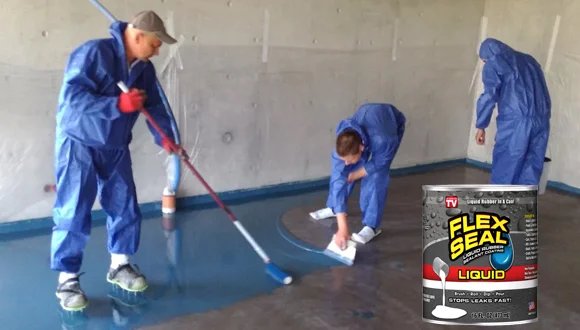
Flex Seal is frequently used for waterproofing a basement, but is it a permanent solution? This seal is often used on roofing, gutters, and pipes but can also be used on concrete basement foundations. While Flex Seal can be an effective waterproofing solution, it is not necessarily permanent.
This seal may last a couple of years, but eventually, it will degrade and need to be replaced. Also, it is not appropriate for all types of basements. Flex Seal is not the most suitable solution if your basement is actively leaking.
Is Flex Seal Better than Other Seal to Waterproof a Basement?
There are a lot of sealants on the market that claim to be able to waterproof a basement, but Flex Seal is one of the few that lives up to the hype. This product will instantly create a watertight seal. As a bonus, this seal can also insulate against noise and vibrations, making it an excellent basement option.
Also, Flex Seal is highly durable and resistant to heat and cold. This makes it ideal for use in basements prone to flooding or leaks. In the end, Flex Seal is the preferred sealant for waterproofing basement walls.
